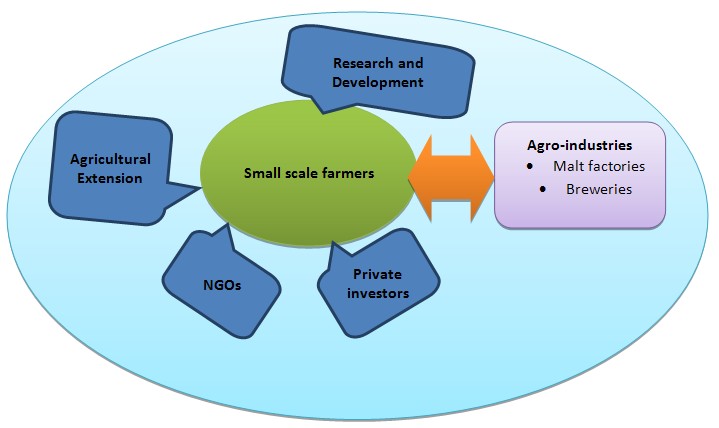Pre-scaling-up of malt barley technologies in bale and west Arsi zones, Southeastern Oromia, Ethiopia: The experience of public-private partnership
Keywords:
Pre-scaling up, Malt barley, Technology, Partnership, Innovation, Transfer, Linkage, Value chainAbstract
The paper presents the out-put, progress and success of pre-scaling up activities of improved malt barley technologies in Sinana, Goba, Dinsho and Gassera Districts of Bale Zone, and Adaba and Dodola Districts of West Arsi Zone of Oromia National Regional State, Ethiopia in the year 2009 to 2013 through the support of Asela Malt Factory and four breweries in multi-stakeholder approach. Generating, demonstrating, evaluating, validating, popularizing and disseminating improved malt barley technologies to smallholder farmers are vital in facilitating adoption of these technologies. The objectives were to convince the merits and increase confidence on the technologies, to strengthening on-farm seed production scheme and farmer- to-farmer seed dissemination system, increase the availability of malt barley seed for farmers and farmers’ ease access to the technologies, improve malt barley seed and grain production knowledge and skill of farmers with the standards of desired quantity and quality, organize producers, strengthening the linkage and pave the way for marketing their produce to agro-industries. A multi-stage purposive sampling technique was employed to select the participant zones, potential districts, Kebeles and farmer for the pre-scaling up activity. Stakeholder analysis was made to select potential stakeholders to implement the activity. Thirty six (36) actors were identified, signed memorandum of understanding and participated in the activity. In capacity building and facilitating farmer-to-farmer extension effort of the technologies, about 1358 individuals (64.8% farmers, 35.2% agricultural experts, development agents and other stakeholders) were attended trainings on malt barley seed and grain production and management practices/packages. In popularizing malt barley technologies, 236.17qt (57qt Misical-21, 142.02qt Holker, 5.5qt Beka and 31.65qt Sabani) have been delivered to 880 smallholder farmers (201 in Adaba, 198 in Dodola, 150 in Dinsho, 101 in Gassara, 150 in Goba and 80 in Sinana districts) during the project period for production of seed that transferred to surrounding other farmers through farmer- to-farmer seed dissemination mechanisms. Field days and travelling workshops were organized to share the experience, evaluate the performance and to communicate the progress of the activity. A total of 450 and 120 individuals were participated on these events during the project period, respectively. Better accessing of malt barley varieties, improving farmers’ skill, knowledge and attitude on this business venture are the impacts attained during the project period. Proper site and farmers selection (lack of malt barley producing cooperatives), weak commitment of actors in implementing the project at all stages of the activity, institutional factors in seed distribution and marketing linkages, shortage of improved seed, and barley-based mono-cropping were the challenges confronted during the implementation. Strengthening linkage of key stakeholders, widely extending the scaling-up of improved malt barley technologies in well-organized and systematic approach, and mapping malt barley value chain require due considerations in order to satisfy exceedingly mounting malt barley demand in Ethiopia.

Published
How to Cite
Issue
Section
Copyright (c) 2020 Amare Biftu, Bekele Hundie, Tafa Jobie, Adamu Zeleke, Tamene Mideksa, Haile Dheressa, Firehiwot Getachew, Girma Fana, Wubishet Alemu, Mengistu Bogale, Tilahun Bayisa, Hiwot Sebsibe

This work is licensed under a Creative Commons Attribution-NonCommercial-NoDerivatives 4.0 International License.



